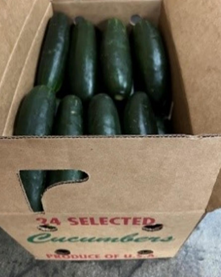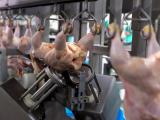A Salmonella outbreak linked to contaminated Florida-grown cucumbers has sickened 162 people, 54 of them requiring hospitalization, in 25 states and Washington, DC, the Centers for Disease Control and Prevention (CDC) said in an outbreak notice yesterday.
Of the 65 people interviewed, 72% reported eating cucumbers. No deaths have been reported.
Testing identified Salmonella Africana in a cucumber collected as part of the investigation, and Fresh Start Produce Sales, Inc. issued a recall. The CDC is conducting further testing to determine whether the bacterial strain is the same one that is causing the illness and whether other cucumbers are also involved in the outbreak.
Shipped to 14 states
The cucumbers, sold in bulk to retail distribution centers, wholesalers, and food-service distributors in 14 states from May 17 to 21, may have then been shipped to additional states or repackaged for sale in stores.
The CDC urges consumers not to eat any recalled cucumbers they have at home.
States that received shipments are Alabama, Florida, Georgia, Illinois (no cases reported), Maryland, North Carolina, New Jersey, New York, Ohio, Pennsylvania, South Carolina, Tennessee, Virginia, and West Virginia (no cases). Other states reporting cases in the outbreak are Arkansas, Connecticut, Delaware, Iowa, Kentucky, Maine, Maryland, Massachusetts, Michigan, Minnesota, Missouri, Rhode Island, and Texas, as well as Washington DC.
Because the cucumbers were recalled, they should no longer be in stores. The grower that likely supplied the cucumbers is done growing and harvesting for the season. The recall doesn't include English cucumbers or mini-cucumbers.
Suspect cucumbers shouldn't be eaten
The CDC urges consumers not to eat any recalled cucumbers they have at home. If unsure whether the cucumbers are part of the recall, consumers can call the store where they were purchased. Any surfaces that may have been contaminated should be washed with hot, soapy water or run through the dishwasher.
Anyone who experiences severe Salmonella symptoms should call their healthcare provider. These symptoms include diarrhea and a fever higher than 102°F, diarrhea lasting longer than 3 days, bloody diarrhea, severe vomiting, and signs of dehydration (eg, low urination, dry mouth and throat, dizziness).
People most often contract Salmonella infections through contaminated food or water. While some people report no symptoms, most have diarrhea, abdominal cramps, and fever in the ensuing 6 hours to 6 days of exposure. The diarrhea can lead to severe dehydration and require medical treatment—especially in young children, adults aged 65 years and older, and people with weakened immune systems—but most people recover within a week without treatment.




















